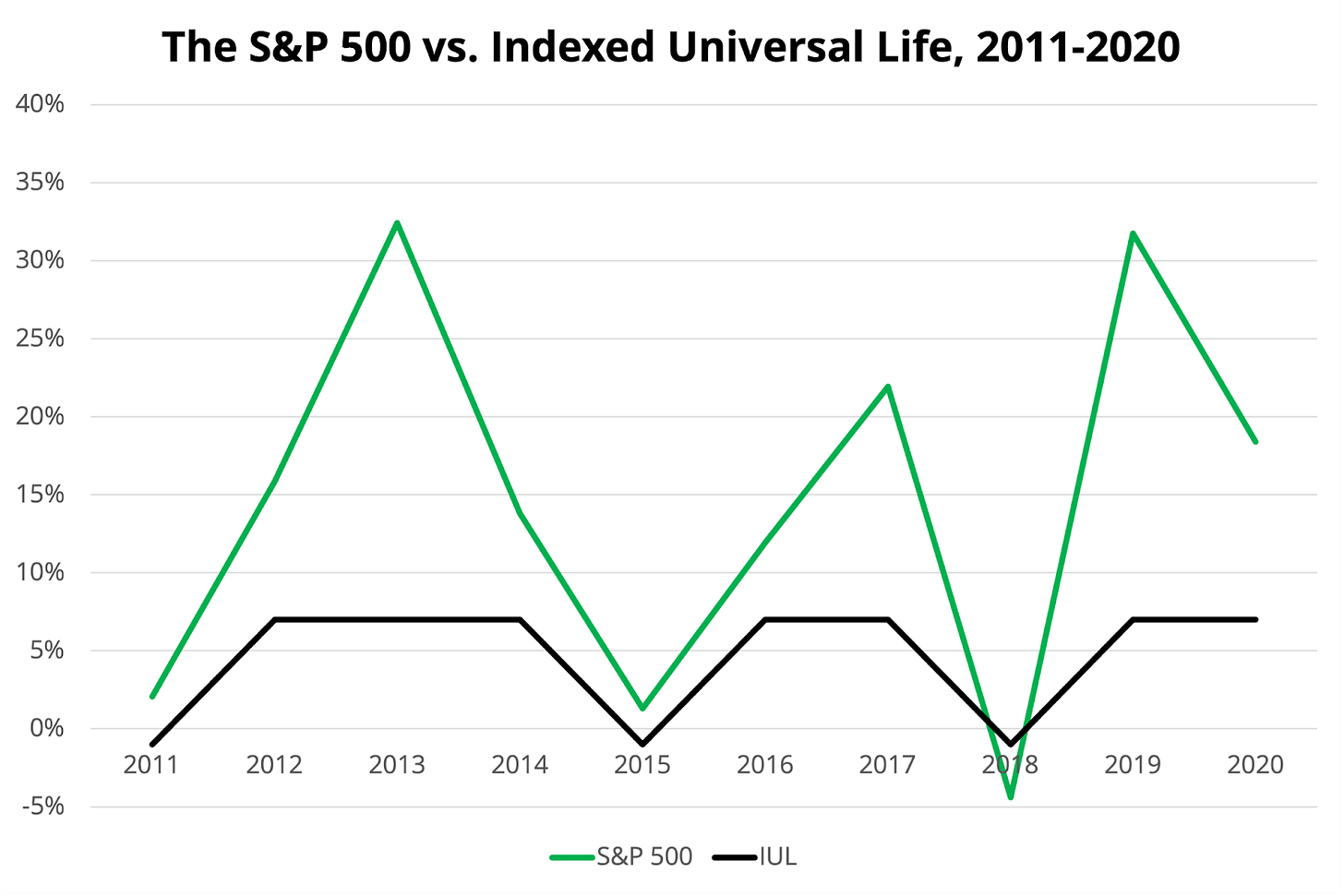All Categories
Featured
Table of Contents
Do they contrast the IUL to something like the Lead Total Supply Market Fund Admiral Shares with no lots, a cost proportion (EMERGENCY ROOM) of 5 basis points, a turn over ratio of 4.3%, and a phenomenal tax-efficient record of circulations? No, they contrast it to some awful proactively taken care of fund with an 8% tons, a 2% EMERGENCY ROOM, an 80% turn over proportion, and an awful document of temporary capital gain circulations.
Mutual funds commonly make yearly taxable circulations to fund owners, also when the value of their fund has actually dropped in value. Mutual funds not just need income reporting (and the resulting yearly tax) when the common fund is rising in value, however can likewise enforce earnings tax obligations in a year when the fund has dropped in worth.
That's not how common funds work. You can tax-manage the fund, gathering losses and gains in order to lessen taxable distributions to the investors, but that isn't in some way mosting likely to change the reported return of the fund. Only Bernie Madoff types can do that. IULs prevent myriad tax traps. The possession of common funds might require the shared fund proprietor to pay estimated tax obligations.

IULs are simple to place to ensure that, at the owner's death, the beneficiary is not subject to either income or estate taxes. The same tax decrease methods do not function nearly also with mutual funds. There are countless, frequently costly, tax catches connected with the timed buying and selling of shared fund shares, catches that do not apply to indexed life insurance policy.
Chances aren't really high that you're going to go through the AMT because of your mutual fund distributions if you aren't without them. The rest of this one is half-truths at best. While it is real that there is no earnings tax obligation due to your heirs when they inherit the proceeds of your IUL plan, it is additionally real that there is no income tax obligation due to your beneficiaries when they inherit a mutual fund in a taxable account from you.
Indexed Universal Life Insurance Definition
The government inheritance tax exemption limit mores than $10 Million for a couple, and growing annually with rising cost of living. It's a non-issue for the huge bulk of physicians, much less the remainder of America. There are better methods to stay clear of estate tax concerns than acquiring investments with low returns. Mutual funds might cause revenue tax of Social Safety benefits.
:max_bytes(150000):strip_icc()/dotdash-comparing-iul-insurance-iras-and-401ks-Final-71f14693e37d4fb1b0736112179802b5.jpg)
The growth within the IUL is tax-deferred and may be taken as free of tax revenue through finances. The plan proprietor (vs. the shared fund supervisor) is in control of his or her reportable revenue, therefore enabling them to reduce or perhaps eliminate the tax of their Social Security advantages. This set is excellent.
Here's another minimal concern. It holds true if you get a common fund for state $10 per share simply prior to the circulation date, and it disperses a $0.50 distribution, you are then going to owe tax obligations (possibly 7-10 cents per share) although that you haven't yet had any kind of gains.
In the end, it's truly concerning the after-tax return, not how much you pay in tax obligations. You are mosting likely to pay more in tax obligations by making use of a taxed account than if you get life insurance. However you're additionally possibly mosting likely to have more cash after paying those tax obligations. The record-keeping demands for owning common funds are considerably more complicated.
With an IUL, one's records are maintained by the insurance provider, duplicates of yearly statements are mailed to the owner, and distributions (if any type of) are completed and reported at year end. This set is additionally kind of silly. Certainly you need to keep your tax obligation records in situation of an audit.
Best Performing Iul
Hardly a reason to purchase life insurance. Shared funds are commonly component of a decedent's probated estate.
On top of that, they undergo the hold-ups and costs of probate. The profits of the IUL plan, on the other hand, is always a non-probate distribution that passes beyond probate directly to one's named recipients, and is therefore not subject to one's posthumous lenders, undesirable public disclosure, or comparable hold-ups and expenses.
We covered this set under # 7, yet simply to summarize, if you have a taxed mutual fund account, you have to put it in a revocable trust (or perhaps much easier, utilize the Transfer on Death designation) to avoid probate. Medicaid incompetency and lifetime earnings. An IUL can supply their owners with a stream of earnings for their whole lifetime, no matter for how long they live.

This is useful when arranging one's affairs, and converting possessions to revenue before an assisted living home confinement. Shared funds can not be converted in a comparable way, and are practically constantly thought about countable Medicaid assets. This is an additional silly one supporting that bad people (you recognize, the ones who require Medicaid, a government program for the bad, to spend for their assisted living home) need to use IUL as opposed to shared funds.
Term Life Vs Universal
And life insurance policy looks dreadful when compared fairly versus a retirement account. Second, people who have cash to acquire IUL above and beyond their retired life accounts are going to need to be dreadful at handling money in order to ever qualify for Medicaid to spend for their retirement home costs.
Persistent and incurable illness motorcyclist. All plans will allow a proprietor's easy access to money from their plan, frequently waiving any type of abandonment fines when such individuals experience a severe disease, need at-home treatment, or come to be restricted to a retirement home. Common funds do not supply a similar waiver when contingent deferred sales charges still apply to a shared fund account whose owner requires to offer some shares to money the prices of such a stay.
Best Iul Companies 2021
Yet you get to pay even more for that benefit (biker) with an insurance coverage. What a large amount! Indexed universal life insurance policy supplies fatality advantages to the recipients of the IUL owners, and neither the owner nor the recipient can ever lose money because of a down market. Common funds offer no such warranties or survivor benefit of any kind of kind.
Now, ask yourself, do you in fact need or want a survivor benefit? I definitely don't need one after I get to economic freedom. Do I desire one? I mean if it were inexpensive sufficient. Certainly, it isn't inexpensive. Typically, a buyer of life insurance policy pays for truth expense of the life insurance policy advantage, plus the expenses of the policy, plus the earnings of the insurer.
Index Life Insurance Companies
I'm not entirely certain why Mr. Morais included the entire "you can not lose money" again here as it was covered fairly well in # 1. He simply wished to duplicate the most effective selling factor for these points I mean. Once more, you do not shed nominal dollars, yet you can lose actual dollars, as well as face significant opportunity price as a result of low returns.

An indexed universal life insurance policy policy owner might trade their plan for an entirely different policy without activating income taxes. A shared fund proprietor can stagnate funds from one mutual fund business to another without selling his shares at the previous (thus triggering a taxable occasion), and buying brand-new shares at the last, often based on sales costs at both.
While it is true that you can exchange one insurance coverage for one more, the factor that individuals do this is that the initial one is such a dreadful plan that also after purchasing a new one and undergoing the early, adverse return years, you'll still come out in advance. If they were offered the right plan the initial time, they shouldn't have any desire to ever exchange it and go through the early, negative return years once again.
Latest Posts
Net Payment Cost Index Life Insurance
Best Iul Insurance Companies
Index Linked Term Insurance